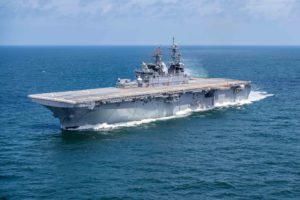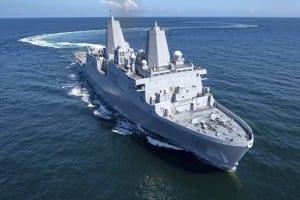The Navy released a draft Request for Proposals (RFP) this week that sets a draft schedule for the Navy to find information on providing Ship Self Defense System (SSDS) Combat System (CS) Ship Integration and Test (SI&T) for various non-Aegis ships.
The draft RFP notice said the Navy aims to “gauge industry interest and capability in providing CS SI&T efforts on Aircraft Carriers and Large Deck Amphibious Ships. The Navy is interested in the full potential of industry responses to include small businesses.”

This will cover Nimitz and Ford-class aircraft carriers as well as large deck amphibious ships like Landing Helicopter Assault Ships (LHAs), Amphibious Assault Ships (LHDs), Amphibious Transport Dock Ships (LPD)s, and Dock Landing Ships (LSDs).
The notice underscored this will be a competitive solicitation procurement with a performance period of one base year and up to nine option years for a total potential 10-year contract.
The latest update to the draft solicitation, posted n April 8, notes according to current plans the Navy expects to release the full RFP in the fourth quarter of FY 2020 and award the contract in the second quarter of FY 2022. However, the Navy noted those dates are notional and are “strictly estimates.”
The Navy is looking for responses on various items in the CS I&T effort including:
- Providing program management, planning, and training;
- Development, assessment, modification, and update of CS Test Procedures, CS Master Test Plan, and CS Test Sequence Network;
- Development, review, assessment, modification, and update of CS Installation Control Drawings and CS Interface Control Drawings to include end-to-end CS Interface Control Drawings, and CS Space Arrangement drawings;
- CS Ship Integration and Test Planning;
- Waterfront Integration and Test of the CS and CS Support Equipment at the system and subsystem levels for all Aircraft Carriers and Large Deck Amphibious Ships;
- Providing support to Government Test Teams in conducting the CS Ship Test and Trials Program; and
- Engineering studies to include feasibility studies for CS improvements and provide life cycle In-Service Support of CS.
Last August, the Navy awarded
Lockheed Martin [LMT] a $56 million contract to become the new SSDS Combat System Engineering Agent (CSEA) for non-Aegis ships. The contract includes options that if fully exercised raise the total value to $638 million (Defense Daily, Aug. 15, 2019).

The SDSS combat system integrates sensors and weapons to defend the non-Aegis equipped ships like carrier and amphibious ships. Lockheed Martin already serves as the CSEA for the Aegis combat system as well.
As CSEA the company is working to develop, integrate and maintain combat systems in the ships’ self-defense systems. After the award, Lockheed Martin told Defense Daily it is specifically evolving the SDSS combat system into Build 12, adding new capability upgrades and maintaining in-service baselines (Defense Daily, Aug.19).
Then, in September, Raytheon [RTN] filed a protest with the Government Accountability Office (GOA) against Lockheed Martin’s win. Raytheon was the incumbent engineering agent for the SDSS, having served since the program began (Defense Daily, Sept. 9)
On Dec. 13, the GAO denied Raytheon’s protest that argued the Navy improperly evaluated technical and cost proposals. The Navy judged both offers at the same level except found Raytheon’s technical approach outstanding while Lockheed Martin’s was good. However, Raytheon’s total contract cost was $336 million compared to Lockheed Martin’s $288 million.
The GAO concluded the Navy’s evaluation and selection decision were reasonable and consistent with the terms of the solicitation.